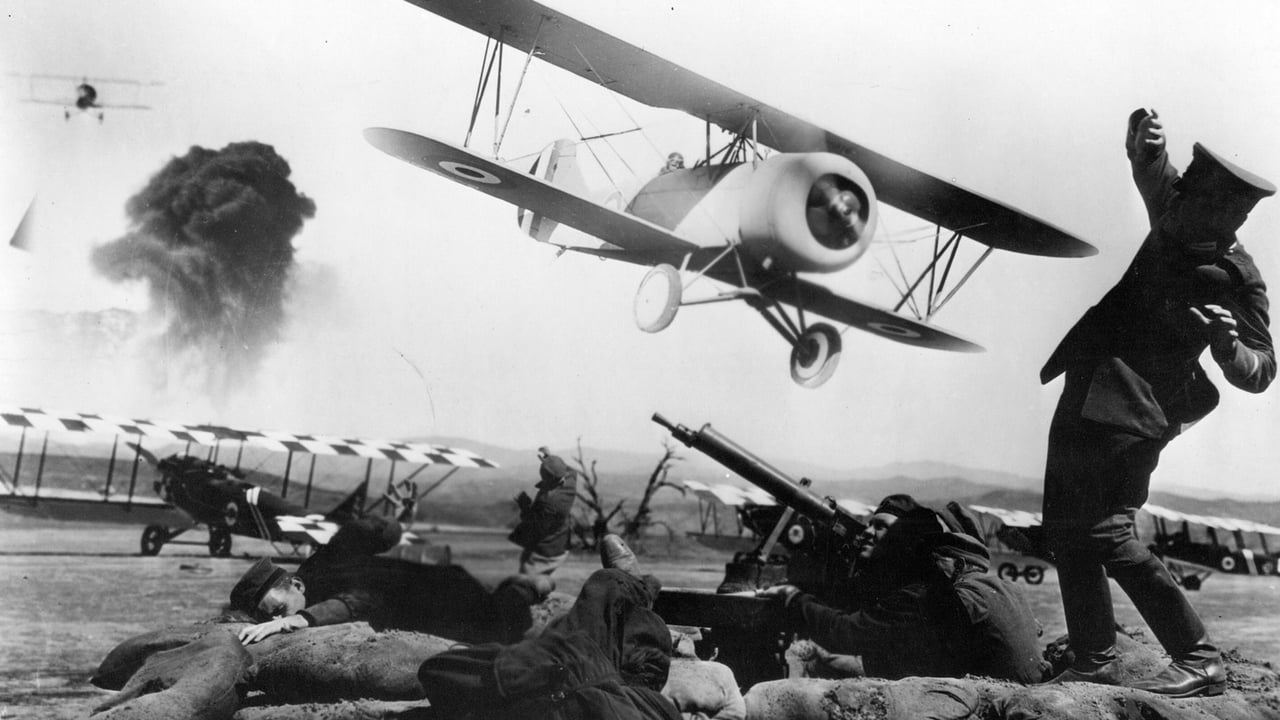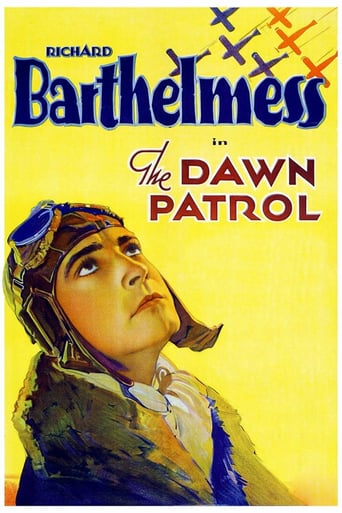

The Dawn Patrol is a 1930 war film focusing on the aviation aspects of the Great War. The story follows Dick Courtney, an ace pilot fighting for the Royal Flying Corps. As the plot progresses, Courtney's unit is faced with endless suicide missions and heavy casualty rates.The movie is a true-to-form war story. Without focusing too much on the overall arc of the war and the larger picture, the story focuses instead on a select few soldiers and their own personal struggles. The conflict is well-written and the casting is decent. There are also many great action shots, such as aerial views of bombs being dropped and the resulting explosions.Unfortunately, the movie is faced with many moments of bad acting. Examples of over-acting, over-the-top performances, bad deliveries, and overly phony death scenes abound in this film. The attempts at comedy are corny and should have been left out. Melodrama constantly bursts into the picture, with otherwise serious characters flying into "say it ain't so!" moments and "don't tell me he's g-g-g-gone!" scenes. At one point, a soldier nonchalantly dives into an opera in an otherwise songless picture.Overall, you could skip this film. This movie might be pleasing to those who enjoy war movies or perhaps specifically those who like World War I movies. Otherwise, you're not missing much if you decide to miss this one.
... View MoreThis is what film-making is all about! The Vitaphone audio recording process challenges itself almost continuously in this early talkie. You aurally count the number of planes coming in (off-camera) while watching the reaction of the principals inside the office. You even get the correct fidelity of the wind-up gramophone as characters talk over it. Meanwhile, you watch aerial dogfights that switch seamlessly from soundstage re-creations to actual footage made by a camera mounted at the front of an aeroplane, without any jarring sense of displacement. The melodrama remains palpable with very little over-acting. I'm taking one point off for that occasional over-acting, and for the really dumb use of Southern California semi-desert topography in which the planes take off and land. It wouldn't have been that hard to find a location with a few more trees and more grass. Oh, well. The movie still must have knocked the original audiences' socks off.
... View MoreAlthough William Wellman is the Hollywood director most associated with air films, not counting of course the self indulgent Howard Hughes, Howard Hawks with The Dawn Patrol and with Air Circus and Only Angels Have Wings can certainly hold is own against the formidable Mr. Wellman on his own turf.This may have been Howard Hawks's first sound feature and he debuted magnificently with a story about a group of fliers from the United Kingdom's Royal Flying Corps of World War I. John Monk Saunders wrote the original story for the screen that netted The Dawn Patrol an Academy Award for that category.The story centers on three men. Group commander Neil Hamilton who has to send his men up against some of Germany's best fliers and two of his senior pilots, Richard Barthelmess and Douglas Fairbanks, Jr. Hamilton is a troubled man indeed, having to send barely trained kid pilots and he hears about it from Barthelmess and Fairbanks.One fine day, oddly enough to do a daring assault that Barthelmess and Fairbanks pull off, Hamilton gets a promotion up to the staff headquarters. In a curious bit of poetic vengeance he names Barthelmess his replacement.Of course when Barthelmess now is seeing the war from Hamilton's point of view, he starts to behave differently. What he does and the choices he makes are the basis for the rest of this story about some of the United Kingdom's most gallant generation lost in the first terrible total war of the last century.As Fairbanks and Barthelmess criticize Hamilton in what he does, I do wonder about when they were the fresh recruits. They became the veterans more than likely by sheer chance that they did survive. Yet that never plays a part in their thinking.The aerial combat sequences are excellently staged, Howard Hughes and William Wellman could hardly have done better. They were so good that they got used again in the 1938 remake of this film.The Dawn Patrol also marked the film debut of Frank McHugh who graced Warner Brothers films for the next 20 years. I've said in many comments and on their respective pages that it could almost not be a Warner Brothers film without either Frank McHugh or Alan Hale or both in a given feature, they appeared so often. The brothers Warner, got their work out of those two.The 1938 remake with Errol Flynn, David Niven, and Basil Rathbone is the one most are familiar with. Still this one is the real deal.
... View MoreThis fine movie directed by Howard Hawks is more potent for its absolutely dazzling aerial photography and filming, one of the best I've ever seen - much better than the eighties Top Gun. First, let me say the late twenties to late thirties was the height of what is known as the Aviator movie. Many hits were scored using this genre including this one which was a blockbuster in 1930. The thirties aviator movies in their flight sequences have a certain feeling to them. They are so realistic in look, and this is achieved without music being used, but just the whirring of the engines gaggling, give it a prescient omniprescence that advances in movie technology, Digital imagery and CGI can't duplicate. I mean, any of the thirties aviator pictures sparkle in their flight segments. It must be the way they were shot. I wonder what technique was used. The story for this movie which won an Oscar was written by John Monk Saunders who obviously knew the genre well. He also wrote Wings, the first Academy award winner, Legion of the Condemned, an even bigger hit than Wings with Gary Cooper, Devil Dogs of the Air and West Point of the Air. The leads are Richard Barthelmess and Doug Fairbanks jr. Barthelmess gives the real performance here while Fairbanks gives the movie star performance. They are involved in WWI and are ace pilots and best of friends. The film has a pandemic tone and regurgitating pace that feeds the ennui of war. Like the pilots of Top Gun, they tend to go against orders given by their boss, silent screen leading man, Neil Hamilton who has the tough job of sending men on their missions, missions in which lives will surely be lost. He doesn't like it but he has to follow orders. That is the theme of the movie, obeying and serving your job because it is necessary. Life is hard and fulfilling your function/role against all odds is rote. Tough choices have to be made for the greater good. Cliche but true. That is the irony of war and when one falls, another must takes his place. Barthelmess eventually takes Hamilton's job and in his shoes feels the pressures the man felt and the toughness of following necessary orders. It is not an anti-war movie, more than it is a WAR IS HELL! but heaven is only one more day of hell away. Slow because of early talkie cameras which needed absolute silence to be recorded and were static without any movement, but sets are highly believable and bombing raids uncharacteristically realistic. Dialogue though is a bit pedestrian with certain heavy-handed moments, in today's glare, and performances not up to par in certain areas but overall, a fine movie.
... View More